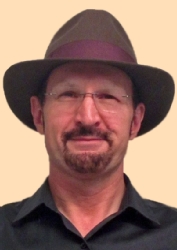Bruce W. Smith
Associate Professor

- Email:
- bwsmith@unm.edu
- Office:
- Logan Hall, 152
- Education:
- Ph.D., Arizona State University, Tempe, Arizona, 2002
- Lab Website
- Curriculum vitae
Research Area/s:
Diversity and Health Data Across the Lifespan
Profile:
Accepting students? Dr. Smith is not accepting students for Fall 2026.
Research Interests:
The study of resilience as the ability to bounce back from stress and thriving as the ability to learn, grow, and benefit from stress. The development of interventions that increase happiness and well-being in the context of stress and the challenges across the life span. The potential for stories that embody the “hero’s journey” as the common human struggle with adversity for enabling us to be resilient and thrive.
A. Resilience
Our studies of resilience and thriving have focused on the identification of resources and interventions that may increase them. These include mindfulness, a sense of meaning and purpose in life, emotional regulation, emotional disclosure, gratitude, compassion, kindness, spirituality, and other strengths that have become the focus of positive psychology.
Our lab developed the Brief Resilience Scale to assess resilience as the ability to bounce back from stress. As of May 2023, it has been cited over 5,000 times and is freely available in the first article below:
Smith, B.W., Dalen, J., Wiggins, K., Tooley, E., Christopher, P., & Bernard, J. (2008). The Brief Resilience Scale: Assessing the ability to bounce back. International Journal of Behavioral Medicine, 15, 194-200. https://doi-org.libproxy.unm.edu/10.1080/10705500802222972
Smith, B.W., Tooley, E.M., Christopher, P.J., & Kay, V.S. (2010). Resilience as the ability to bounce back from stress: A neglected personal resource? Journal of Positive Psychology, 5, 166-176. https://doi.org/10.1080/17439760.2010.482186
The kinds of stressors and problems we have focused on have included health problems such as chronic pain, cancer, and cardiovascular disease. They have also included the chronic stressors and daily hassles faced by healthy adults and college students and traumatic stressors, such as natural disasters, terrorist attacks, and those experienced by first responders (e.g., firefighters). Here are some examples:
Smith, B.W., Ford, C.G., & Steffen, L.E. (2019). The role of mindfulness in reactivity to daily stress inurban firefighters. Mindfulness, 10, 1603-1604. https://doi.org/10.1007/s12671-019-01102-0
Smith, B.W., Christopher, P. J., Bouldin, L. E., Tooley, E. M., Bernard, J. F., & Ortiz, J.A. (2010). Benefit finding predicts improved emotional health following cardiac rehabilitation. R. E. Murphy (Ed.), Health Psychology. (pp. 113-125). Hauppauge, NY: Nova Science.
Smith, B.W., Dalen, J., Bernard, J.F., & Baumgartner, K.B. (2008). Posttraumatic growth in non-Hispanic white and Hispanic women with cervical cancer. Journal of Psychosocial Oncology, 26, 91-109. https://doi-org.libproxy.unm.edu/10.1080/07347330802359768
B. Mindfulness Interventions
We have developed mindfulness-based interventions and those incorporating aspects of motivational interviewing and other acceptance-based approaches (Acceptance and Commitment Therapy Dialectic Behavioral Therapy). Here are studies where we compared or adapted mindfulness-based interventions:
Ortiz, J.A., Smith, B.W., Shelley, B.M., & Erickson, K.S. (2019). Adapting mindfulness to engage Latinos and improve mental health in primary care: A pilot study. Mindfulness, 10, 2522-2531. https://doi-org.libproxy.unm.edu/10.1007/s12671-019-01229-0
Smith, B.W., Shelley, B.M., Sloan, A.L., Colleran, K., & Erickson, K. (2018). A Preliminary randomized controlled trial of a mindful eating intervention for post-menopausal obese women, Mindfulness, 9, 836-849. https://doi.org/10.1007/s12671-017-0824-9
Smith, B.W., Shelley, B.M., Dalen, J., Wiggins, K., Tooley, E., & Bernard, J. (2008). A pilot study comparing the effects of Mindfulness-Based and Cognitive-Behavioral Stress Reduction. Journal of Alternative and Complementary Medicine, 14, 251-258. https://doi:10.1089/acm.2007.0641
C. Positive Psychology and the Hero’s Journey
We are examining positive psychology in relation to Joseph’s Campbell idea of a common hero’s journey for enable people to enhance happiness and well-being in the context of the stresses and trauma of life. The value of a coherent and redemptive narrative is based in the work of people like James Pennebaker, Laura King, and Dan McAdams and its value in relation to stress is expressed in the following:
Smith, B.W. (2020). The hero’s journey to resilience and thriving in the context of disaster. In Stefan Schulenberg (Ed.), Positive Psychology and Disaster Mental Health (pp. 81-98). Springer.
We are studying the idea of a hero’s journey in the context of a positive psychology classes that challenge students to use it enable them to use what they learn to improve happiness and well-being. This idea is presented in the textbook we developed listed below and available at Amazon.com:
Smith, B.W. (2018). Positive psychology for your hero’s journey: Discovering true and lasting happiness. Kindle Direct Publishing.
We have completed research on the effects of the face-to-face and online positive psychology classes based on this textbook. The following articles report our research showing that students who took these classes showed increased in happiness, well-being, and resilience and decreased anxiety, depression, and stress relative to students taking other psychology classes:
Smith, B.W., deCruz-Dixon, N., Erickson, K., Guzman, A, Phan, A., & Schodt, K. (2023). The effects of an online positive psychology class on undergraduate happiness, health, and Well-being, Journal of Happiness Studies, 24, 1145–1167. https://doi-org.libproxy.unm.edu/10.1007/s10902-022-00577-4
Smith, B.W., Ford, G.C., Erickson, K., & Guzman, A. (2021). The effects of a character strength focused positive psychology course on undergraduate happiness and well-being. Journal of Happiness Studies, 22, 343-362. https://doi.org/10.1007/s10902-020-00233-9
Based on these positive psychology classes and the support of the Center for Applied Positive Psychology (CAPP) in New Mexico, we developed the following Positive Psychology Workbook and the accompanying videos. The workbook is available at Amazon.com:
Smith, B.W. (2021). Move from surviving to thriving: The positive psychology workbook for challenging times. Kindle Direct Publishing.
Courses Taught
PSYC 2320 Health Psychology
PSYC 454/554 Positive Psychology
PSYC 455L Positive Psychology Lab
PSYC 450 Psychology Teaching Practicum
PSYC 514 Health Psychology Interventions
Lab
Graduate Students
Kaitlyn Schodt
Naila deCruz-Dixon
Opportunites for Future Graduate Students
Dr. Smith does not plan to take a new graduate student in 2024.
Opportunities for Undergraduate Students
Dr. Smith is not currently looking for undergradate research assistants for his lab.
